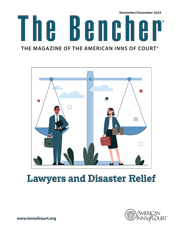Maybe You Should Buy that Rankings Plaque!
The Bencher—November/December 2024
By Raffi Melkonian, Esquire

 A few times a year, lawyers of all kinds post their awards on their firm websites and their social media channels. Obscure specialists are declared lawyers of the year, rising stars, legal dragons, and super-duper lawyers. A decade ago there were a few such lists, but now the number of rankings and awards available to lawyers has ballooned.
A few times a year, lawyers of all kinds post their awards on their firm websites and their social media channels. Obscure specialists are declared lawyers of the year, rising stars, legal dragons, and super-duper lawyers. A decade ago there were a few such lists, but now the number of rankings and awards available to lawyers has ballooned.
Many lawyers’ first reaction is to roll their eyes. After all, an award that many people get seems like no award at all. And the fact that many of the companies creating the awards also hawk plaques, trophies, and advertisements based on the awards gives the skeptical observer pause. However, maybe that initial reaction isn’t quite right; maybe awards and rankings of this kind are part of how rapid technological change is making the legal world more accessible for clients and newer lawyers.
The lawyers at the venerable firm where I began my career would sometimes joke that business development was picking up the phone on the third ring instead of the fourth. After all, the firm’s prestige and organizational reputation was enough to drive business its way. The situation is quite different for new entrants into the legal marketplace, especially lawyers from underrepresented groups. As the legal profession continues to diversify and broaden its base, there’s an increasing number of exceptional lawyers emerging from non-traditional backgrounds or smaller practices. These individuals often lack obvious pathways to earn recognition.
This challenge is compounded by the fact that lawyers, as a professional group, are famously bad at praising others. Why laud your new and rising competitors, one might think? Accolades and rankings might provide an opportunity for talented individuals to break through the artificial barriers that often block them from receiving due recognition. In essence, these awards give underrepresented lawyers a platform to poke their heads above the fray, making it easier for them to be noticed by potential clients, employers, or collaborators.
In many ways, the proliferation of magazine awards and rankings mirrors the broader democratization of the legal profession I have previously written about in this column, a trend largely driven by social media and technological advancements. Historically, a newer lawyer aspiring to build a reputation had few options but to patiently wait their turn. In a world dominated by major newspapers, there was no real way to tell people about your skills. And even time didn’t always work. Many fields were dominated by well-established law firms and public interest organizations whose reputations created seemingly insurmountable barriers for newcomers.
The landscape today, however, is markedly different. Lawyers now have access to a multitude of platforms and tools to showcase their skills and expertise, making it easier to overcome traditional hierarchies and barriers. Social media platforms, in particular, have become vibrant hubs where legal professionals can demonstrate their knowledge across a wide spectrum of specialties. These online spaces are teeming with lawyers and experts in diverse fields such as small transactions, appellate litigation, employment law, arbitration, and numerous other legal niches. These new awards and rankings are a part of these changes. Just as social media allows lawyers to express their expertise in new ways, the proliferation of rankings lets new entrants into the system display their credentials to the world.
This democratization is not without its drawbacks. Social media platforms famously allow people with limited expertise to present themselves as authorities. This can lead to the spread of misinformation and confusion among those seeking reliable legal information. And, the anonymity and distance provided by online platforms have exacerbated civility issues within legal practice. People often feel emboldened to make statements online that they would never consider uttering in face-to-face interactions. Similarly, legal awards and rankings that aren’t rooted in reality can promote people that haven’t been vetted by the traditional pathways of the legal profession. Not every award winner is a great lawyer.
Still, while it’s easy to dismiss the proliferation of legal awards and rankings and the use of technology as mere marketing gimmicks, we should consider their potential to level the playing field. For underrepresented lawyers and those from non-traditional backgrounds, these new tools can serve as valuable stepping stones in a profession that has long been dominated by established hierarchies. As for the plaques? The real award we may all get is a more dynamic profession.
Raffi Melkonian, Esquire, is an appellate partner at the Houston, Texas, law firm of Wright, Close & Barger LLP. He litigates appeals in the state and federal courts of Texas and around the United States. He can be reached at melkonian@wrightclosebarger.com. Melkonian is Master of the Bench member of the Garland R. Walker American Inn of Court.